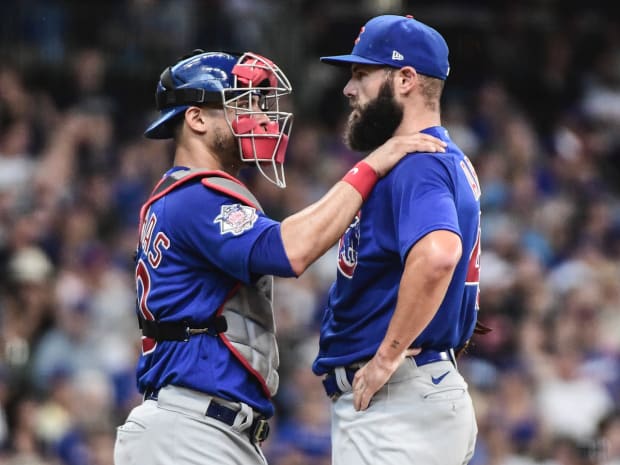Chicago's matchup Wednesday against the division-leading Brewers played out like a horror show for the Cubs, but they can learn something from it.
Welcome to The Opener, where every weekday morning you’ll get a fresh, topical column to start your day from one of SI.com’s MLB writers.
The Cubs began Wednesday’s game against the Brewers with seven first-inning runs and ended it with infielder Eric Sogard on the mound. The intervening baseball played out like a Chicago horror show.
The Brewers turned a 7-0 deficit into a 15-7 victory, running their winning streak to eight games while handing the Cubs their sixth consecutive loss. The win puts Milwaukee six games clear in first place in the NL Central, while bringing to an end what’s been a trying month for Chicago.
The issues for the Cubs were manifold, but they began with a familiar theme for this season: starting pitching. Wednesday’s starter, Jake Arrieta, failed to get out of the second inning, giving up six runs (three earned) on four hits and four walks. Four of the eight balls put in play had expected batting averages above .700. Only five of Arrieta’s 56 pitches resulted in a swing-and-miss.
“Everything that can go wrong has gone wrong for us lately,” Arrieta said afterwards, per the Chicago Sun-Times. “It’s been tough. I didn’t get the job done, period … This one’s on my shoulders. There’s no way around it.”
A blown lead of this nature is, unsurprisingly, no small feat. Milwaukee’s win was just the sixth time since 1950 that a team trailed by at least seven runs and went on to win by at least seven runs. It was also the first game in the modern era (since 1901) that each team held at least a seven-run lead through the first four innings, and only the second time a team lost by at least seven runs after scoring seven runs in the first inning.

The outing caps an ugly month for the former Cy Young Award winner. Arrieta’s ERA ballooned to 8.31 in six June starts, three of which were done by the end of the third inning. Arrieta has given up seven home runs in 21.2 innings, with the Cubs losing five out of his six starts.
But the 35-year-old is hardly the only one struggling in the Cubs’ starting rotation. Chicago ranks dead last in starting pitching fWAR on the season, with the third-lowest strikeout rate (19.5%), fifth-highest home run rate (1.53 HR/9) and second-highest FIP (4.98). The group posted a 5.19 ERA in June, averaging 4.31 walks per nine innings.
A strong month of May eased some concern around this group after a disastrous April, but those reassurances have all but completely dissipated. Even the rotation’s top performer, Kyle Hendricks, appears to be skating on thin ice. Hendricks’ expected ERA (4.93) is almost a full run higher than his actual ERA (3.98), while his home run rate (1.94 HR/9) is the third-highest among qualified starters.
A division that was bunched up not too long ago is now the most lopsided in the league. The Brewers hold the largest lead of any first-place team, and they’re the only club in the division with a positive run differential (plus-30). Despite the disastrous last four weeks, the Cubs have actually not been the worst NL Central club this month. That dubious honor belongs to the Cardinals, whose three-game sweep of the Diamondbacks brought their June record to a mere 10-17.
A six-game lead can evaporate pretty quickly, and the Cubs are by no means out of the race. But the starting pitching woes don’t look like they’re going to fix themselves. Barring an aggressive acquisition before the July 30 trade deadline, Chicago’s arms don’t look to be postseason quality, especially when compared to Milwaukee’s three-headed monster of Corbin Burnes, Brandon Woodruff and Freddy Peralta.
In the absence of an all-in approach from the front office over these next few weeks, the chances of the Cubs running down the Brewers appear slim. At least there was one promising development on the mound for Chicago at the end of Wednesday's humbling loss—Sogard made his fourth relief appearance this year, and he hasn’t given up a run yet.
Quick hits:
- Even unicorns have bad days. In fact, two of them did in the same game Wednesday night in New York. Shohei Ohtani’s two-way day failed to escape the first inning, as Ohtani's command faltered in the Bronx. He walked four Yankees and hit another en route to allowing seven runs while recording just two outs. But the Angels put up a seven-spot of their own in the ninth against Aroldis Chapman, who blew the lead with three walks and a game-tying grand slam to Jared Walsh—the first grand slam allowed in the flame-throwing closer's career. A two-run single from Luis Rengifo off Lucas Luetge, in to relieve Chapman, provided the Halos with the game-winning runs in an 11-8 win that Yankees manager Aaron Boone could only lament as a "terrible loss" for the Bombers.
- In a high-scoring day throughout the league, the Braves set the pace by scoring 20 runs against the Mets. Ozzie Albies homered twice and drove in seven runs to lead the charge. Perhaps Atlanta should have saved some runs for Thursday’s opposing pitcher, Jacob deGrom.
- Trea Turner sure does know how to celebrate. He became the fourth player in the last 100 years to hit for the cycle three times in a career—and he did so on his 28th birthday. The shortstop also stole two bases for good measure, putting him in sole possession of the National League lead with 18. Maybe this is the year he earns his first All-Star Game nod.
More MLB Coverage:
• Roundtable: Which Unsung Players Should Be All-Stars?
• Sticky Stuff Enforcement Is Already Making Baseball a Better, Fairer Game
• Marquéz Loses No-Hit Bid, but Achieves Something Rarer in Today's Game
• Kyle Schwarber Isn't Paying Attention to the Numbers